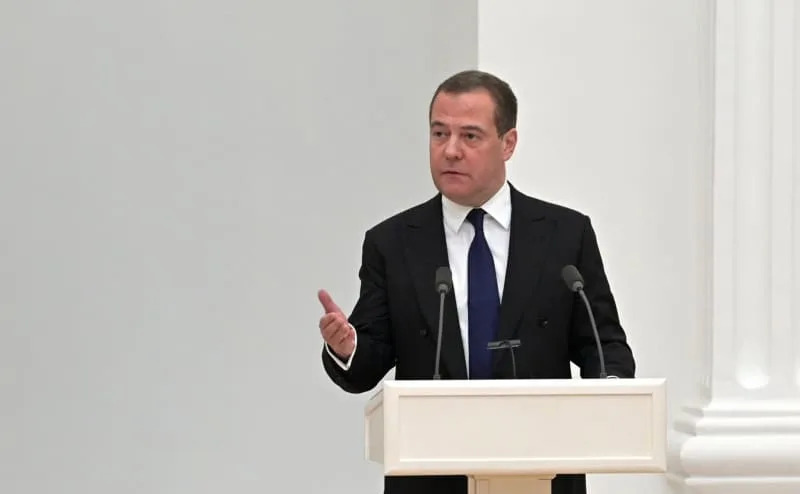dpa international
Medvedev again threatens nuclear war amid more deaths in Ukraine
DPA – February 18, 2024

Former Russian president Dmitry Medvedev has once again threatened the West with an all-out nuclear war if Russia is pushed back to its internationally recognized 1991 borders after the war in Ukraine.
In a Telegram post on Sunday, the current deputy chairman of the Russian Security Council reiterated his well-known position that “nuclear powers never lose a war” as long as they defend their homeland.
In a short thought experiment, he discussed the case of Ukraine’s success in this war. In his opinion, the return of Ukraine to its old borders would contradict the Russian constitution, especially as the conquered territories in eastern Ukraine and Crimea had already been annexed as integral parts of Russia.
The 1991 borders are the common, internationally recognized border lines of Russia and Ukraine before the annexation of the Crimean Peninsula by Moscow in 2014 and before the full-scale Russian invasion of Ukraine in February 2022.
“And now to the main question: Do these idiots [in the West] really believe that the Russian people would accept such a disintegration of their country?” wrote Medvedev.
On the contrary, the Russian armed forces would deploy their entire arsenal and attack Washington, Berlin or London in addition to Kiev.
He said that these and other “beautiful historical places were entered long ago as targets of [Russia’s] nuclear triad,” referring to the configuration of land-based intercontinental missiles, submarine-launched missiles and strategic bombers with nuclear bombs.
During his time in office as president from 2008 to 2012, Medvedev was regarded as a liberal, moderate politician. Since the start of the Russian war against Ukraine almost two years ago, he has turned into an extremist and is now one of the West’s harshest critics.
There are no concrete indications that Russia’s leadership is actually planning to use nuclear weapons.
Despite several setbacks during the war ordered by President Vladimir Putin, Russia continues to occupy around a fifth of Ukraine, including the Crimean peninsula, and currently sees itself on the path to victory.
Putin on Sunday also commented on the war, Russia considers the situation in Ukraine to be “vital.”
For the West, on the other hand, it is just a question of tactics, Putin said on Sunday in an interview on state television, quoted by the state-run news agency TASS.
While the West was taking tactical positions on Ukraine, for his country it was “a matter of fate, a matter of life or death.” If the West had not intervened, “the war would have ended a year and a half ago.”
“We switched from initially peaceful measures to military instruments and tried to end this conflict peacefully,” Putin claimed. Further, Russia is still prepared to negotiate a peaceful solution.
Moscow’s and Kiev’s positions on a possible peace solution are far apart. While Kiev insists on the return of all occupied territories, including the Crimean peninsula, Russia wants to keep the conquered territories that it has already integrated into its national territory.
On the ground in Ukraine, at least three people have been killed in Russian drone and missile attacks in eastern Ukraine, local leaders said on Sunday.
Two bodies have been recovered so far from the rubble of a residential building in the city of Kramatorsk that was struck by a missile overnight, said Vadym Filashkin, the military governor of the Donetsk region, on Telegram.
The rescue operation is continuing and further victims are suspected to be under the debris, he said.
Oleh Syniehubov, the head of the military administration in the neighbouring Kharkiv region, reported one dead and five injured in an attack on a two-storey residential building in the front-line city of Kupiansk.
Russia attacked its neighbour overnight with six S-300 anti-aircraft missiles that were converted to strike land targets, three Ch-22 cruise missiles and a Ch-59 air-to-surface missile, according to the Ukrainian Air Force.
The Russian military launched 14 Shahed combat drones, 12 of which were destroyed before reaching their target. The air-to-surface missile was also intercepted and a Russian fighter jet was shot down, the air force said.
British intelligence officials believe that Russia could have replaced the head of its Black Sea Fleet, Admiral Viktor Sokolov, likely because of “Ukraine’s success in sinking various ships under his command.”
In its daily intelligence update on the war published by the Ministry of Defence (MoD) in London on Sunday, said various “Russian pro-war commentators” had reported on Sokolov’s removal from his post, which has so far not been confirmed by the Russian Defence Ministry.
One such report had been published on the Rybar Telegram channel, considered to be close to the ministry in Moscow.
According to the MoD update on X, “Sokolov has likely been replaced by his now former deputy, Vice Admiral Sergei Pinchuk as acting commander until an internal investigation of the 15 February 2024 sinking of the Ropucha-class Caesar Kunikov landing ship is concluded.”
The MoD in London has been publishing daily intelligence reports on the war since the beginning of Russia’s full-scale invasion of Ukraine.
Moscow accuses London of spreading misinformation.














